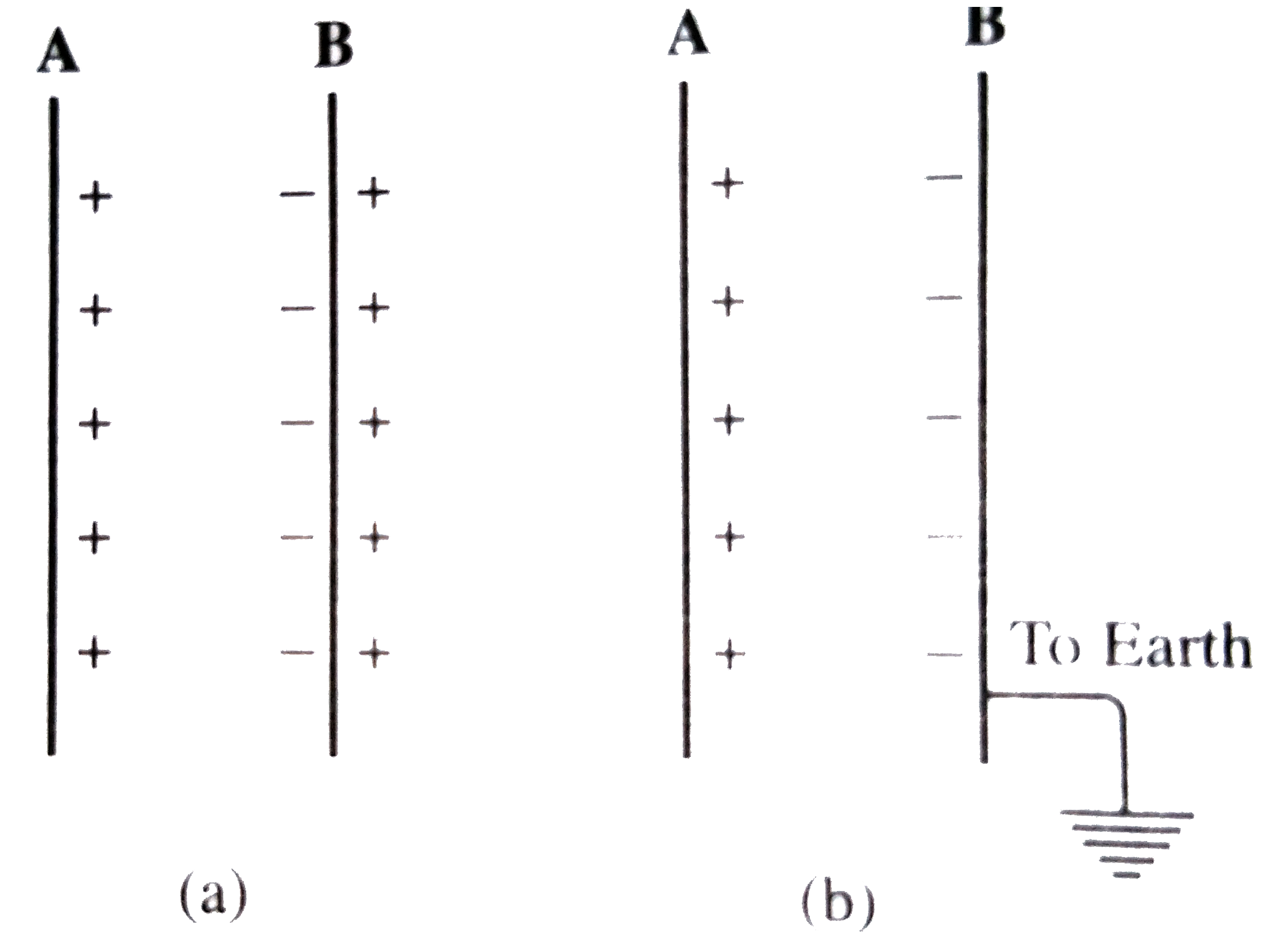Explain the concept of a capacitor.
Video Solution
Text Solution
Concept of a capacitor : The surface of an isolated charged conductor is an equipotential surface with a potential V with respoet some arbitrary zero reference level, usually the ground. V>0 , i.e., positive if the charge on the conductor is positive, while V<0, i.e., negative if charge on the conductor is negative. If the charge Q on the conductor is increased, V increases in the same proportion. The proportionality constant C is called the capacity of the conducto |Q|=C|V|
Any conductor can be used to store charges, however, its capacity can be increased by keeping a grounded conductor near it. This is the principle of capacitor.
Consider a metal plate A whose potential is raised to V by depositing a charge +Q on it, so that its capacity is C=Q/V. Now, if an uncharged metal plate B is brought close to plate A, then negative bound charge -Q will be induced on the surface of B near A and positive free charge +Q on the other side of B, Fig. (a).
If plate B is grounded, i.e., connected to the Earth, the free charge on it resist will escape to the Earth, Fig. (b). The bound charge (-Q) thus remaining on B will lower the potential of A, as if superimposing a potential −v1 on the potential V of plate A. The resultant potential of A will become V-V, and its capacity will be Q/(V - V). Keeping plate B very wire To Earth close to A, V-V, can be made very small, so that the capacity of the

combination can become very much greater than the capacity of conductor A alone.
|
Updated on:21/07/2023
Topper's Solved these Questions
- BOOK - NAVNEET PUBLICATION - MAHARASHTRA BOARDCHAPTER - EXPLANATION, CHARACTERISTICS AND PROPERTIES EXERCISE - Current Electricity1videos
EXPLANATION, CHARACTERISTICS AND PROPERTIES
- BOOK - NAVNEET PUBLICATION - MAHARASHTRA BOARDCHAPTER - EXPLANATION, CHARACTERISTICS AND PROPERTIES EXERCISE - Magnetic Efffect of Electric Current1videos
EXPLANATION, CHARACTERISTICS AND PROPERTIES
- BOOK - NAVNEET PUBLICATION - MAHARASHTRA BOARDCHAPTER - EXPLANATION, CHARACTERISTICS AND PROPERTIES EXERCISE - Interference and Diffraction2videos
EXPLANATION, CHARACTERISTICS AND PROPERTIES
- BOOK - NAVNEET PUBLICATION - MAHARASHTRA BOARDCHAPTER - EXPERIMENTS AND DIAGRAMSEXERCISE - ATOMS, MOLECULES AND NUCLEI1videos
EXPERIMENTS AND DIAGRAMS
- BOOK - NAVNEET PUBLICATION - MAHARASHTRA BOARDCHAPTER - INSTRUMENTS : CONSTRUCTION AND WORKING EXERCISE - Semiconductors6videos
INSTRUMENTS : CONSTRUCTION AND WORKING
Similar Questions
Explain the concept of Heat
View SolutionExplain the concept of human capital formation .
View SolutionExplain the concept of IVF.
View SolutionExplain the concept of IVF.
View SolutionExplain the concept of IVF.
View SolutionExplain the concept of a production function.
View SolutionExplain the concept of a production function.
View SolutionExplain the concept of operon.
View SolutionExplain the concept of a national state?
View SolutionExplain the concept of temperature.
View Solution
